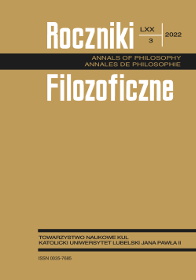On Biomorphic Benevolence to Nature
Abstract
Edward Osborne Wilson formulated the biophilia hypothesis according to which biophilia is a tendency to focus on life and life-like processes. The status of this hypothesis is controversial among the natural, social and environmental sciences as well as in environmental ethics. On the methodological level, among other things, the charge of non-falsifiability is made; ecological ethicists criticize the hypothesis for its anthropocentric implications. In this article, we propose a philosophical interpretation of biophilia as a form of biomorphism, according to which the concept of substantive being, values and norms of morality are based on the paradigm of living being.
References
Arystoteles. 1990. Metafizyka. Tłum. Kazimierz Leśniak. W: Arystoteles. Fizyka. O niebie. O powstawaniu i niszczeniu. Meteorologika. O świecie. Metafizyka. Warszawa: Państwowe Wydawnictwo Naukowe (PWN).
Arystoteles. 1972. O duszy. Tłum. Paweł Siwek, Warszawa: Wydawnictwo Naukowe PWN.
Berto, Rita. 2005. „Exposure to restorative environments helps restore attentional capacity”. Journal of Environmental Psychology 25, no. 3: 249–259. DOI: https://doi.org/10.1016/j.jenvp.2005.07.001.
Besthorn, Fred H., i Dennis Saleebey. 2003. „Nature, Genetics, and the Biophilia Connection: Exploring Linkages with Social Work Values and Practice”. Advances in Social Work 4, no. 1: 1–18. DOI: https://doi.org/10.18060/39.
Chang, Chen-Yen, i Ping-Kun Chen. 2005. „Human response to windows views and indoor plants in the workplace”. Hort Science 40, no. 5: 1354–1359. DOI: https://doi.org/10.21273/HORTSCI.40.5.1354.
Freeman, Claire, Katharine J.M. Dickinson, Stefan Porter, Yolanda Van Heezik. 2012. „‘My garden is an expression of me’: exploring householders’ relationship with their gardens”. Journal of Environmental Psychology 32, no. 2: 135–143.
Gullone, Eleonora. 2000. „The Biophilia Hypothesis and Life in the 21st Century: Increasing Mental Health or Increasing Pathology?”. Journal of Happiness Studies 1, no. 3: 293–321. DOI: https://doi.org/10.1023/A:1010043827986.
Joye, Yannick. 2011. „‘Nature and I are Two’: A Critical Examination of the Biophilia Hypothesis”. Environmental Values 20, no. 2: 189–215. DOI: https://doi.org/10.3197/096327111X12997574391724.
Kant, Immanuel. 1984a. Krytyka praktycznego rozumu. Tłum. Jerzy Gałecki. Warszawa: Państwowe Wydawnictwo Naukowe [PWN].
Kant, Immanuel. 1984b. Uzasadnienie metafizyki moralności. Tłum. Mścisława Wartenberg, Warszawa: Państwowe Wydawnictwo Naukowe [PWN].
Kant, Immanuel. 2005. Metafizyczne podstawy nauki o cnocie. Tłum. Włodzimierz Galewicz. Kęty: Wydawnictwo Antyk.
Kaplan, Stephen. 1995. „The restorative benefits of nature: Toward an integrative framework”. Journal of Environmental Psychology 15, no. 3: 169–182. DOI: https://doi.org/10.1016/0272-4944(95)90001-2.
Kaplan, Rachel, Stephen Kaplan i Terry Brown. 1989. „Environmental preference: a comparision of four domains of predictors”. Environmental and Behavior 21: 509–530. DOI: https://doi.org/10.1177/0013916589215001.
Kellert, Stephen R., i Edward O. Wilson. 1993. The biophilia hypothesis. Washington, DC: Island Press.
Łuków, Paweł. 2006. „Kantowskie obowiązki względem przyrody — człowiek a pozostałe zwierzęta”. W: Świadomość środowiska, red. Włodzimierz Galewicz, 63–85. Kraków: Towarzystwo Autorów i Wydawców Prac Naukowych Universitas.
Marr, Carolyn A., Linda French, Donna Thompson, Larry Drum, Gloria Greening, Jill Mormon, Irie Henderson, Carroll W. Hughes. 2015. „Animal-Assisted Therapy in Psychiatric Rehabilitation”. Anthrozoös 13, no. 1: 43–47. DOI: https://doi.org/10.2752/089279300786999950.
Mayer, F. Stephan, Cynthia McPherson Frantz, Emma Bruehlman-Senecal, i Kyffin Dolliver. 2008. „Why Is Nature Beneficial?: The Role of Connectedness to Nature”. Environment and Behavior 20, no. 10: 1–37. DOI: https://doi.org/10.1177/001391650 8319745.
Nagel, Thomas. „Jak to jest być nietoperzem”. Tłum. Adam Romaniuk, W: Pytania ostateczne, 203–219. Warszawa: Fundacja Aletheia 1997.
Piątek, Zdzisława. 1998. Etyka środowiskowa. Nowe spojrzenie na miejsce człowieka w przyrodzie. Kraków: Księgarnia Akademicka.
Rand, Ayn. 1964. „The Objectivist Ethics”. W: Ayn Rrand. The Virtue of Selfishness. New York: New American Library.
Shaw, Amy, Kelly Miller i Geoff Wescott. 2013. „Wildlife Gardening and Connectedness to Nature: Engaging the Unengaged”. Environmental Values 22, no. 4: 483–502. DOI: https://doi.org/10.3197/096327113X13690717320748.
Spaemann, Robert. 1997. Szczęście a życzliwość. Esej o etyce. Tłum. Jarosław Marecki. Lublin: Redakcja Wydawnictw KUL.
Spaemann, Robert. 2001a. Grenzen: zur ethischen Dimension des Handelns. Stuttgart: Klett-Cotta.
Spaemann, Robert. 2001b. Osoby. O różnicy między czymś a kimś. Tłum. Jarosław Marecki. Warszawa: Oficyna Naukowa.
Spaemann, Robert. 2006. Granice. O etycznym wymiarze działania. Tłum. Jarosław Merecki. Warszawa: Oficyna Naukowa.
Spaemann, Robert, i Reinhard Löw. 2008. Cele naturalne. Dzieje i ponowne odkrycie myślenia teleologicznego. Tłum. Andrzej Półtawski. Warszawa: Oficyna Naukowa.
Taylor, Paul W. 1986. Respect for Nature. A Theory of Environmental Ethics. Princeton: Princeton University Press.
Ulrich, Roger S. 1984. „View through a window may influence recovery from surgery”. Science 224, no. 4647: 420–421. DOI: https://doi.org/10.1126/science.6143402.
Wilson, Edward O. 1984. Biophilia. Cambridge, MA, London: Harvard University Press.
Wilson, Edward O. 1993. „Biophilia and the conservation ethic”. W: The Biophilia Hypothesis, red. Stephen R. Kellert i Edward O. Wilson, 31–41. Washington, DC: Island Press.
Copyright (c) 2022 Roczniki Filozoficzne

This work is licensed under a Creative Commons Attribution-NonCommercial-NoDerivatives 4.0 International License.





